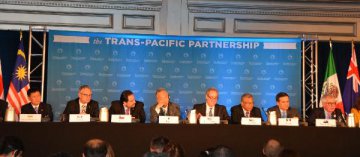
Australia's Trade Minister Andrew Robb has on Thursday signed the controversial Trans-Pacific Partnership (TPP), but rejected calls it needed an independent cost-benefit analysis. Opponents of the TPP have called for the analysis after the World Bank revealed it would only lift Australia's GDP by 0.7 percent by 2030.
However, Robb, who signed the agreement with counterparts from the 11 other nations on Thursday, said that calls for the cost-benefit analysis were the latest attempts by the "usual suspects" to derail the agreement. "No we won't (order the analysis), because they're all the usual suspects," Robb told the Australian Broadcasting Corporation. "Most of the people driving that campaign have been opponents of free trade for decades. They're entitled to that view, but nothing that would come out of an inquiry would change their mind, " he said.
The trade minister, who was also in charge of negotiating Australia's free trade agreement with China, praised the TPP and said it would open up opportunities for "millions" of Australians. Critics have been vocal on the "miniscule gains" the TPP is likely to result in, with Patricia Ranald, conveyor of the Australian Fair Trade and Investment Network, telling The Guardian on Thursday that Robb had failed to address the concerns. "We are not opposed to trade," Ranald said, adding "We are making the point that the TPP is not mainly about trade at all."
"Australia already has free trade agreements with nine of the 12 TPP countries, and a World Bank study shows there will be minuscule trade gains after 15 years," Ranald said. The Trans-Pacific Partnership is a multi-national free trade agreement between Australia, Brunei, Canada, Chile, Japan, Malaysia, Mexico, New Zealand, Peru, Singapore, the United States and Vietnam.



















Latest comments